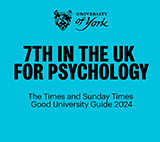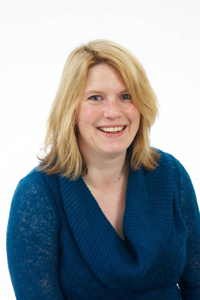
Silke Göbel
Professor
Profile
Biography
- J.W. Goethe Universität
Diplom-Psychologin - Oxford University
DPhil
Graduated in Psychology from the J.W. Goethe Universität, Frankfurt a.M., Germany; then moved to Oxford, UK; after completing her Ph.D. there in 2002 she stayed on as a Junior Research Fellow in Psychology for three years; then came to York.
Current research interests: Numerical Cognition
- Development of number processing and arithmetic
- Number and space
- Cross-cultural differences in number processing and counting
- Number processing and arithmetic in dyslexia/dyscalculia
- Cognitive Neuroscience: Parietal Lobe Functions
Career
- Oxford University
Junior Research Fellow, Jesus College (2002-2005)
Departmental roles
- Director of the MSc Course in Developmental Cognitive Neuroscience
- Admissions for the MSc Course in Developmental Cognitive Neuroscience
- Chair of MSc Exam Board
Research
Overview
Mathematical cognition and parietal lobe functions, in particular:
- visuo-spatial number representations
- number processing in dyslexia and dyscalculia
- development of number processing and its neural correlates
- cross-cultural differences in number processing and counting
Research methods
- longitudinal studies
- behavioural experiments
- repetitive Transcranial Magnetic Stimulation (rTMS)
- functional Magnetic Resonance Imaging (fMRI)
Grants
ESRC Research Grant
Principal Investigator,Three-hundred-and-twenty-eight and 328: cross-format number integration and its relationship to mathematics performance, £465 950 (April 2017-March 2020)
Collaborators
- Martin Fischer , Potsdam, Germany
- Hans-Christoph Nuerk, Tuebingen, Germany
- Karin Landerl, Graz, Austria
- Korbinian Moeller, Tuebingen, Germany
Available PhD research projects
I would be particularly interested to hear from postgraduates interested in Developmental Cognitive Neuroscience.
Supervision
- Chia-Yuan Lin
- Ruggero De Agostini
Publications
Selected publications
- Göbel, S. M., McCrink, K., Fischer, M.H., & Shaki, S. (2018). Observation of directional storybook reading influences young children’s counting direction. Journal of Experimental Child Psychology 166, 49-66.
- Göbel, S. M.,Watson, S.E., Lervåg, A., & Hulme, C. (2014). Children’s arithmetic development: it is number knowledge, not the approximate number sense, that counts. Psychological Science, 25(3), 789-798.doi:10.1177/0956797613516471
- Göbel, S. M.,, Moeller, K., Kaufmann, L., Pixner, S., & Nuerk, H.-C. (2014). Language affects symbolic arithmetic in children: The case of number word inversion. Journal of Experimental Child Psychology, 119, 17-25. doi: 10.1016/j.jecp.2013.10.001
- Göbel, S.M., Shaki, S., & Fischer, M. H. (2011). The Cultural Number Line: A Review of Cultural and Linguistic Influences on the Development of Number Processing. Journal of Cross-Cultural Psychology 42(4), 543-565.
- Göbel, S.M., Calabria, M., Farné, A. & Rossetti, Y. (2006). Parietal rTMS distorts the mental number line: Simulating ‘spatial‘ neglect in healthy subjects. Neuropsychologia 44, 860-868.
- Göbel, S.M., Johansen-Berg, H., Behrens, T.E., & Rushworth, M.F.S. (2004). Response-selection related parietal activation during number comparison. Journal of Cognitive Neuroscience 16, 1536-1551.
Textbook
Gilmore, C., Göbel, S.M., & Inglis, M. (2018). An Introduction to Mathematical Cognition. International Texts in Developmental Psychology. Hove: Routledge
Full publications list
See also the York Research Database for a full list of publications.
Book chapters
- Göbel, S.M. (2018). How Culturally Predominant Reading Direction and Number Word Construction Influence Numerical Cognition and Mathematics Performance. In Berch, D., Geary, D., & Mann Koepke, K. (Eds). Language and Culture in Mathematical Cognition. London: Academic Press.
- Göbel, S.M. (2015). Reading difficulties and mathematics. In Dowker, A. & Cohen Kadosh, R. (Eds)..Oxford Handbook of Numerical Cognition, 680-704. Oxford: OUP. doi: 10.1093/oxfordhb/9780 199642342.013.044
- Snowling, M.J., & Göbel, S.M. (2010). Reading Development and Dyslexia. In Goswami, U.C. (Ed.) The Wiley-Blackwell Handbook of Childhood Cognitive Development, 524-548 (Second Edition). Oxford: Wiley-Blackwell.
Peer-reviewed journal articles
- Göbel, S.M., McCrink, K., Fischer, M.H., & Shaki, S. (2018). Observation of directional storybook reading influences young children’s counting direction. Journal of Experimental Child Psychology 166, 49-66.
- Bahnmueller, J., Huber, S., Nuerk, H.-C., Göbel, S.M., & Moeller, K. (2016). Processing mulit-digit numbers – A translingual eye tracking study. Psychological Research 80 (3), 422-433.
- Moll, K., Göbel, S.M., Gooch, D., Landerl, K. & Snowling, M. J. (2016). Cognitive Risk Factors for Specific Learning Disorder: processing speed, temporal processing and working memory. Journal of Learning Disabilities 49(3), 272-81. doi: 10.1177/0022219414547221
- Alcock, L., Ansari, D., Batchelor, S., Bisson, M.-J., De Smedt, B., Gilmore, C., Göbel, S.M., Hannula-Sormunen, M., Hodgen, J., Inglis, M., Jones, I., Mazzocco, M., McNeil, N., Schneider, M., Simms, V., & Weber, K. (2016). Challenges in Mathematical Cognition: A Collaboratively-Derived Research Agenda. Journal of Numerical Cognition 2(1), 20-41.
- Göbel, S.M, Maier, C. & Shaki, S. (2015). Which numbers do you have in mind? Number generation is influenced by reading direction. Cognitive Processing 16(1), 241-44. doi: 10.1007/s10339-015-0715-8
- Moll, K., Snowling, M. J., Göbel, S.M., & Hulme, C. (2015). Early language and executive skills predict variations in number and arithmetic skills in children at family-risk of dyslexia and typically developing controls. Learning and Instruction 38, 53-62. Doi: 10.1080/09297049.2014.899570
- Ferreira, R.A., Göbel, S.M., Hymers, M., & Ellis, A.W. (2015). The neural correlates of semantic richness: Evidence from an fMRI study of word learning. Brain & Language 143, 69-80. doi:10.1016/j.bandl.2015.02.005
- Moeller, K., Shaki, S., Göbel, S. M. & Nuerk, H.-C. (2015). Forty-seven and seven forty: Language Influences Number Processing – a Quadrilingual Study. Cognition 136, 150-155. doi:10.1016/j.cognition.2014.11.003
- Göbel, S.M. (2015). Up or down? Reading direction influences vertical counting direction in the horizontal plane- a cross-cultural comparison. Front. Psychol. 6:228. doi: 10.3389/fpsyg.2015.00228
- Nuerk, H.-C., Patro, K., Cress, U., Schild, U., Friedrich, C.K., & Göbel, S.M. (2015). How space-number associations may be created in preliterate children: six distinct mechanisms. Front. Psychol. 6:215. doi: 10.3389/fpsyg.2015.00215
- Fischer, M.H., Sixtus, E., & Göbel, S.M. (2015). Commentary: A pointer about grasping numbers. Front. Psychol. 6:227. Doi: 10.3389/fpsyg.2015.00227
- Moll, K., Göbel, S.M., & Snowling, M. J. (2015). Basic number processing in Children with Specific Learning Disorders: Co-morbidity of Reading and Mathematics Disorders. Child Neuropsychology 21(3), 399-417. doi:10.1080/09297049.2014.899570
- Göbel, S.M., Moeller, K., Kaufmann, L., Pixner, S., & Nuerk, H.-C. (2014). Language affects symbolic arithmetic in children: The case of number word inversion. Journal of Experimental Child Psychology, 119, 17-25. doi: 10.1016/j.jecp.2013.10.001
- Göbel, S.M.,Watson, S.E., Lervåg, A., & Hulme, C. (2014). Children’s arithmetic development: it is number knowledge, not the approximate number sense, that counts. Psychological Science, 25(3), 789-798. doi:10.1177/0956797613516471
- Defever, E., Göbel, S.M., Ghesquière, P., & Reynvoet, B. (2014). Automatic number priming effects in adults with and without mathematical learning disabilities. Frontiers in Psychology 5:4. doi: 10.3389/fpyg.2014.00004
- Sasanguie, D., Göbel, S.M., & Reynvoet, B. (2013). Left parietal TMS disturbs priming between symbolic and non-symbolic number representations. Neuropsychologia, 51(8), 1528-1533. doi:10.1016/j.neuropsychologia.2013.05.001
- Landerl, K., Göbel, S.M., & Moll, K. (2013). Core deficit and individual manifestations of developmental dyscalculia (DD): the role of comorbidity. Trends in Neuroscience and Education, 2(2), 38-42. doi: 10.1016/j.tine.2013.06.002
- Sasanguie, D., Göbel, S.M., Moll, K., Smets, K., & Reynvoet, B. (2013). Approximate number system, symbolic number processing or number-space mappings: what underlies mathematics achievement? Journal of Experimental Child Psychology, 114(3), 418-431. doi: 10.1016/j.jecp.2012.10.012
- Kaufmann, L., Mazzocco, M., Dowker, A., von Aster, M., Göbel, S.M., Grabner, R.H., Henik, A., Jordan, N.C., Karmiloff-Smith, A., Kucian, K., Noel, M.-P., Rubinsten, O., Szucs, D., Shalev, R., & Nuerk, H.-C. (2013). Dyscalculia from a developmental and differential perspective. Frontiers in Psychology 4:516. doi: 10.3389/fpyg.2013.00516.
- Shaki, S., Fischer, M. H. & Göbel, S.M. (2012). Direction counts: A comparative study of spatially directional counting biases in cultures with different reading directions. Journal of Experimental Child Psychology, 112, 275-281. doi:10.1016/j.jecp.2011.12.005
- Castronovo, J., & Göbel, S.M. (2012). Impact of high mathematics education on the number sense. PLoS ONE 7(4): e33832. doi:10.1371/journal.pone.0033832.
- Göbel, S.M., Shaki, S. & Fischer, M. H. (2011). Cultural Effects on the mental number line. Journal of Cross-Cultural Psychology 42(4), 541-42.
- Göbel, S.M., Shaki, S. & Fischer, M. H. (2011). The Cultural Number Line: A Review of Cultural and Linguistic Influences on the Development of Number Processing. Journal of Cross-Cultural Psychology 42(4), 543-565.
- Kaufmann, L., Pixner, S., & Göbel, S.M. (2011). Finger usage and arithmetic in adults with math difficulties: evidence from a case report. Front. Psychology 2:254. doi: 10.3389/fpsyg.2011.00254.
- Göbel, S.M. & Snowling, M. J. (2010). Number Processing Skills in Adults with Dyslexia. The Quarterly Journal of Experimental Psychology 63(7), 1361-1373.
- Brozzoli, C., Ishihara, M., Göbel, S.M., Salemme, R., Rossetti, Y. & Farnè, A. (2008). Touch perception reveals the dominance of spatial over digital representation of numbers. PNAS 105 (14), 5644-5648.
- O’Shea, J., Johansen-Berg, H., Trief, D., Göbel, S.M., & Rushworth, M.F.S. (2007). Functionally-Specific Reorganisation in Human Premotor Cortex. Neuron 54, 479-490.
- Göbel, S.M. (2007). Neuronale Korrelate kognitiver Zahlenrepräsentationen während Vergleichs- und einfacher Additionsaufgaben. Beiträge zum Mathematikunterricht, 350-353, Hildesheim: Franzbecker.
- Göbel, S.M., Rushworth, M.F.S. & Walsh, V. (2006). Inferior parietal rTMS affects performance in an addition task. Cortex 42(5), 774-781.
- Göbel, S.M., Calabria, M., Farné, A. & Rossetti, Y. (2006). Parietal rTMS distorts the mental number line: Simulating ‘spatial‘ neglect in healthy subjects. Neuropsychologia 44, 860-868.
- Lavidor, M., Brinksman, V. & Göbel, S.M. (2004). Hemispheric asymmetry and the mental number line: comparison of double-digit numbers. Neuropsychologia 42(14), 1927-33.
- Göbel, S.M., Johansen-Berg, H., Behrens, T.E. & Rushworth, M.F.S. (2004). Response-selection related parietal activation during number comparison. Journal of Cognitive Neuroscience 16, 1536-1551.
- Göbel, S.M. & Rushworth, M.F.S. (2004). Cognitive neuroscience: acting on numbers. Current Biology 14(13), 517-9.
- Rushworth, M.F.S., Johansen-Berg, H., Göbel, S.M. & Devlin, J.T. (2003). The left parietal and premotor cortices: motor attention and selection. NeuroImage 20, 89-100.
- Göbel, S.M., Walsh, V. & Rushworth, M.F.S. (2001). The mental number line and the human angular gyrus. NeuroImage 14(6), 1278-1289.
Teaching
Undergraduate
- Third year Advanced Module: Numerical Cognition
- MPsych Module: Advanced Issues in Experimenal, Cognitive & Social Psychology
Postgraduate
- MSc in Cognitive Neuroscience: Tickling the Brain with TMS, From Vision to Action
- MSc in Development, Disorders and Clinical Practice/ Developmental Cognitive Neuroscience: seminars in: Current Questions in Developmental Research, Advanced Issues in Developmental Disorders

